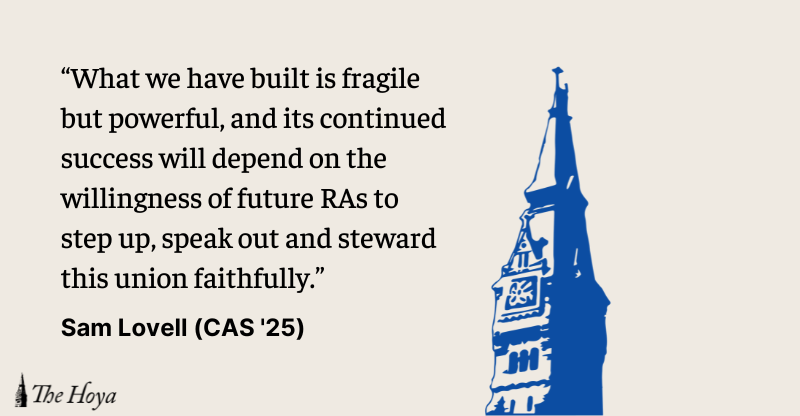
On a warm spring evening late last year, I joined a group of students to celebrate what would ultimately be one of the most meaningful moments of my undergraduate career: the unionization of Georgetown University’s resident assistants (RAs). Our attempt to unionize was far from the first, but we were ultimately the first to succeed — not only among undergraduates at Georgetown, but across all colleges in Washington, D.C., Maryland and Virginia.
After the certification of our union, my colleagues and I began the lengthy process of collective bargaining. Just last week, after seven long months of negotiations and hundreds of hours spent meeting with administrators, the RAs reached a tentative agreement with the university, including topics like compensation, discipline and training, among other details of long-standing interest.
This achievement merits an important moment of reflection. When we founded the Georgetown Resident Assistant Coalition (GRAC) and launched our initial organizing campaign, we did so by calling attention to the issues RAs perceived as most pressing. We pledged to fight for greater accountability in our workplace, a fairer process of assigning discipline, increased compensation and the establishment of a formal staffing ratio, among other priorities. In July, we shared a 38-page proposed contract with our membership delivering on these promises.
Both RAs and avid readers of The Hoya will recognize that the tentative agreement we reached last week appears different from the one we initially proposed, including an unchanged placement process and unresolved issues with how the university’s need-based financial aid reduces our effective compensation. Still, I am no less proud of our wins. We made gains that are in no way small, from the removal of RAs’ at-will status to a provision mandating RAs in good standing retain their jobs to an annual stipend of $3,500. Within the next several weeks, I both hope and expect my colleagues will vote to affirm these wins, securing a better future for the generations of RAs to follow.
Although the conclusion of our first contract is within sight, our work remains unfinished. The effort required to maintain a union is both far greater and far more difficult than that required to create it. By the time the next cohort of RAs will begin to negotiate their contract, a whole generation of undergraduates shall have passed. Indeed, most of GRAC’s work will rest not in negotiating a contract, but in educating, organizing and remembering.
Remembering is essential, for, with the graduation of the Class of 2026, the direct memory of why we unionized will fade, making it all the more vital to preserve our history and purpose for future generations. GRAC must heed this call to ensure its wins do not become transient. Its future leaders must work diligently to ensure the fair enforcement of our contract. In this role, they will have to wear many hats, serving as shop stewards, mediators and committee members. As must leaders of any democratic institution, they will be called to remain receptive to their constituents. They must be proactive in engaging both new RAs and members of our community, like serving in GUSA, speaking with student publications or collaborating with campus groups who share our mission. They must remember: Eyes are watching. In its short time, GRAC has already solicited attention from student workers both on our campus and afar seeking ways to improve their workplaces.
Accordingly, we must strive for our best, not just for ourselves but also for those who look up to us. As we look ahead, the story of GRAC must not become some old opinion piece but instead remain a vibrant and flourishing legacy passed down with care, conviction and clarity. Our fight was never just about a contract. It was about dignity, courage and the belief that student workers can and should shape their workplaces. What we have built is fragile but powerful, and its continued success will depend on the willingness of future RAs to step up, speak out and steward this union faithfully.
To the next generation: GRAC is your inheritance — but more importantly, your responsibility. Treat it not as a finished product, but as a foundation. Build on it. Question it. Defend it. Above all, never forget how far we have come and why we chose to fight in the first place.
Sam Lovell is a senior in the College of Arts & Sciences.